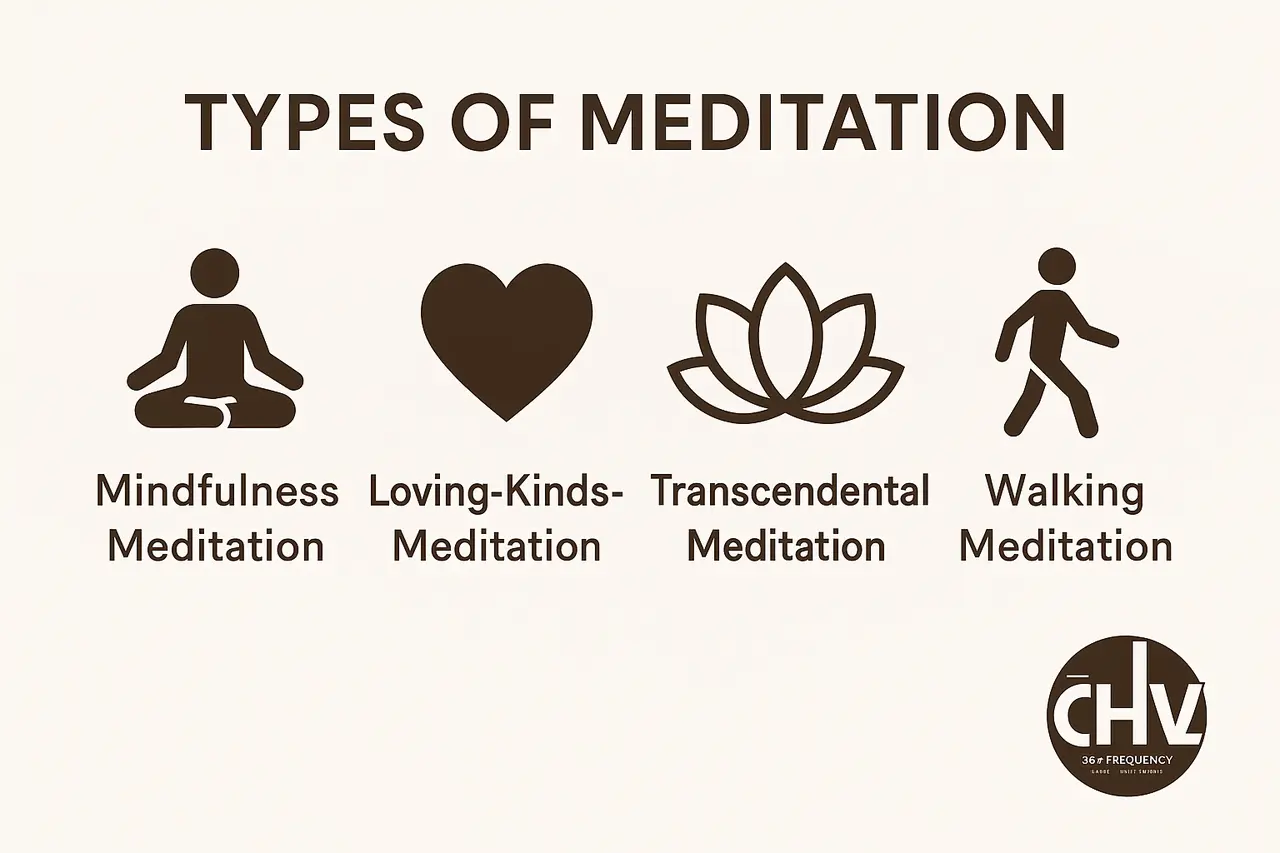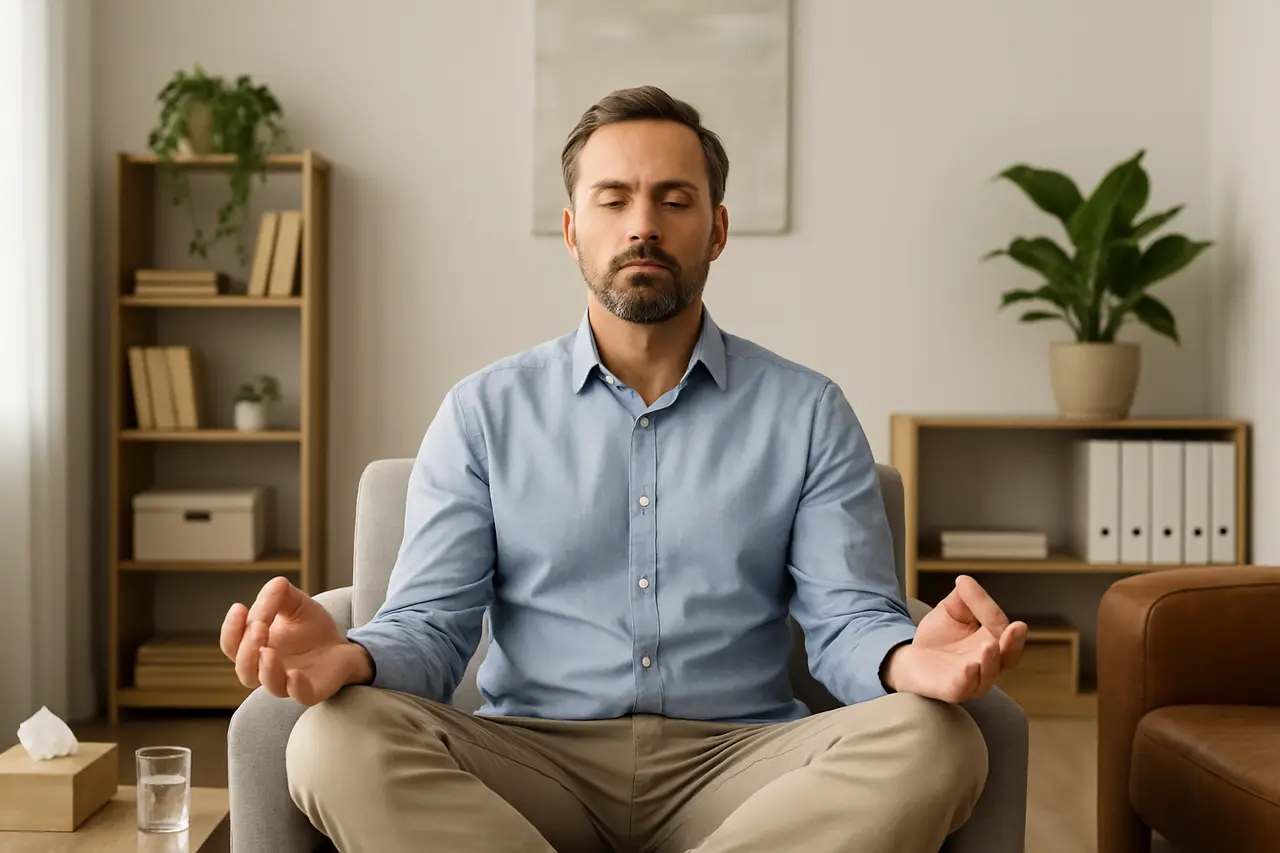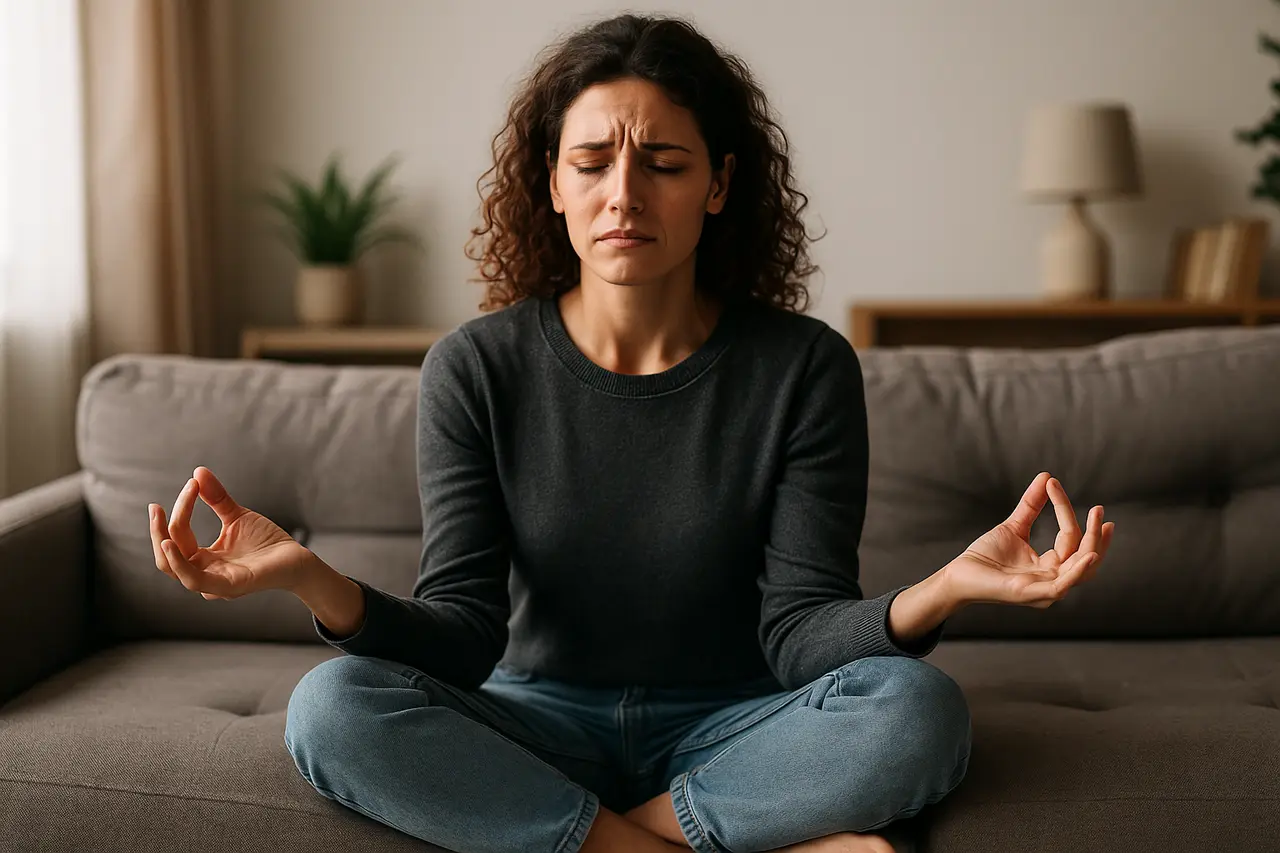Meditation For Depression: Tips & How It Works

Depression drains motivation, energy, and joy. Research shows meditation for depression can ease the burden. Short daily sessions calm racing thoughts and soften depression symptoms. Meditation helps the brain shift away from harmful loops.
Guided meditations teach breathing that reduces stress and anxiety fast. The National Institutes of Health reports similar findings across age groups. Within weeks, many users sleep better, focus longer, and smile more often. No drugs are required, only time, attention, and a quiet spot.
This article explains how meditation can help and how to begin safely.
Mindfulness meditation for depression
Mindfulness meditation for depression trains attention on the present moment. Practitioners observe breath, body, and passing thoughts without judgment. This stance breaks rumination and lifts mood.
Mindfulness meditation grew from Buddhist roots, yet is secular here. A systematic review and meta-analysis of 2024 pooled forty trials. The meta-analysis of randomized controlled trials confirmed the effect.
University studies included athletes, veterans, and university students. Mindfulness-based courses such as MBSR meet once a week for eight weeks.
The mindfulness-based stress reduction program blends body scans, gentle yoga, and sitting meditation. MBSR research on depression shows that cortisol falls as stress levels decrease.
One trial used the anxiety stress scale and measured marked improvement. Another project followed nursing students with a high workload.
They reported lower perceived stress and fewer depressive symptoms after practice. The brief mindfulness intervention lasted only ten minutes online.
Previous research found the effect of mindfulness breathing meditation on sleep and focus. Results suggest a curriculum based on mindfulness fits busy schedules.
The authors concluded that mindfulness reduces mood issues in most participants. Meta data indicates that mindfulness outperforms wait‑list controls across cultures.
The strong effectiveness of mindfulness remains clear despite varied delivery formats. Explore online mindfulness meditation practices if travel is hard.

Types of Meditation That Can Help Deal With Depression
Many types of meditation target distinct mood challenges.
Each meditation practice changes brain circuits regulating the stress response. Scientists link lowered stress hormone cortisol with consistent sessions. The benefits of meditation accumulate when practiced daily.
Regular meditation thickens the prefrontal cortex for stronger emotional control. Meditation alone will not cure depression, yet it supports deeper healing. Combine the use of meditation with counselling or medication when needed.
Clinicians note that meditation, which can help, often feels simple. Sessions lower heart rate, calm breathing, and prepare the mind for growth. Some people meditate in silence, others with soft percussion tracks.
A second meditation practice, breath counting, also enhances vagal tone. Functional MRI confirms thicker gray matter in attention hubs.

Meditation for depressive thoughts
Meditation and depression research reveals workable tactics. Breath‑focused drills interrupt negative thinking before it spirals. This shift can alleviate depressive symptoms within weeks. Neural scans show the brain reacts to stress within milliseconds.
With training, it responds to stress and anxiety in calmer waves. Regular sessions teach awareness of the triggers of depression early. Tracking your depression level daily helps spot growth. Guides ask you to label thoughts and feelings as passing events.
The pause will help you manage these symptoms with confidence. Deep breathing eases anxiety symptoms that accompany low moods. Commitment matters; steady practice shifts depression through meditation.
Some play music to reduce stress or block out negative chatter. If you are going through depression, remember progress happens in small steps.
A regular practice can help your brain better manage stress and anxiety, which can trigger depression
Stress and depression share common neural pathways. When you manage stress well, these circuits quiet. Meditation lowers limbic firing, giving the prefrontal cortex space to lead. Functional scans confirm that stress levels drop within a month.
Stress levels fall fastest when sessions happen each morning. Anxiety and depression also ease as cortisol normalizes; depression also improves focus. For individuals with major depressive disorder, this shift feels liberating.
Depression affects memory, sleep, and decision-making. These health conditions improve when mindfulness strengthens focus. In one dorm study, anxiety among nursing students declined after four weeks.
Another survey noted high depression and anxiety in students before exams. After nightly breathing drills, participants reported lighter moods and better grades. High cortisol keeps the stress hormone active; meditation calms it. The body’s stress response becomes shorter and less intense.
Subscribe to Create Higher Vibrations!
Get Inspiration and Practical advice straight to your inbox.
Approaches to treat depression
Effective plans treat depression with skills, support, and evidence. A therapist may suggest medication, movement, or cognitive behavioral therapy sessions. Therapy for depression often pairs with mindful breathing homework.
This blended approach for depression empowers clients between meetings. Mindfulness-based cognitive therapy teaches relapse warning signs. Studies show the program halves depression relapse.
One meta-analysis of randomized controlled trials backed this claim. Another systematic review and meta-analysis echoed the positive findings. Researchers label MBCT a proven depression treatment with minimal side effects.
Doctors recommend it for the prevention of depression in at‑risk groups. Combined plans help treat depression without excessive medication. A 2023 Spanish trial randomised ninety adults with moderate scores.
Half received MBCT, half attended art classes. Only the MBCT group kept scores low six months later.

How Depression Affects Your Mental Health
Major depression reshapes thinking patterns and behaviour. Chronic sadness stiffens facial muscles and dulls pleasure. Inflammation is linked with depression across age groups. Sleep loss and rumination are associated with depression.
Genetics, trauma, and hormones can cause depression or anxiety. Researchers track depression, anxiety stress scores to map risk. A recent review of the literature highlighted varied factors. Low activity strongly impacts mental health among teens.
Meditation and mental training strengthen resilience against such pressures. Studies report high depression among caregivers facing uncertainty. Depression also disturbs circadian rhythm, delaying sleep hormones.
Brain scans reveal reduced reward pathway firing. Exercise sparks endorphins, yet low energy blocks activity. Meditation primes motivation enough to start gentle movement.
Discover Your Inner Self. Join Our Self-Mastery Program.
Self-Mastery Coaching gives you the space, tools, and guidance to grow, reflect and discover your values and inner strength.

Bottom Line
The use of mindfulness rewires attention and buffers reactivity. Mindfulness-based stress reduction on depression trials confirms durable gains, even during chaos due to the COVID-19 pandemic. Regular breathwork can reduce stress without drugs.
Slow exhalations also reduce anxiety and deepen rest. Data show no severe side effects when teachers screen participants. Still, meditation doesn’t replace clinical care for high‑risk cases. Combining sessions with counseling, exercise, and a balanced diet.
Mindfulness meditation practices are safe, low‑cost, and scalable. The journal headline read, ‘Meditation may rival medication for mild cases’. Monitor mood daily; note sleep, diet, and practice streaks. Seek help fast if thoughts darken.
Mindful attention remains a tested, compassionate approach for depression that anyone can start today. Vishnu Ra is a Master Meditation Coach who can help you establish a practice. If this interests you, contact him today!


